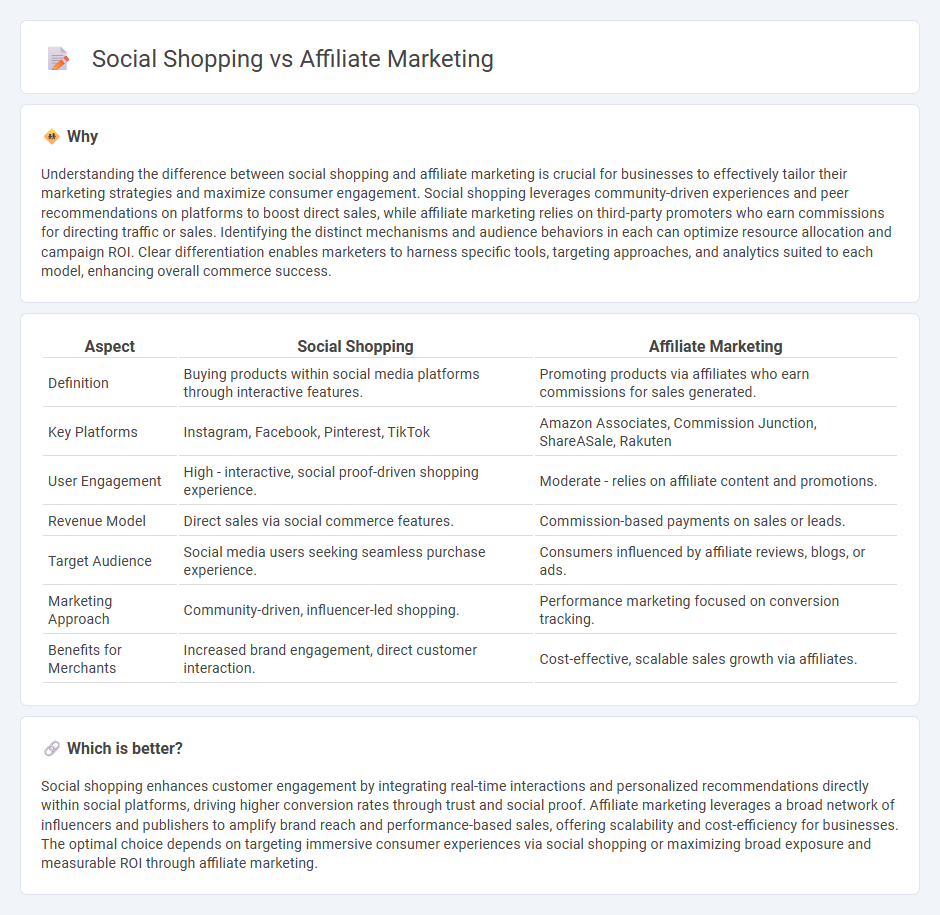
Social shopping leverages peer recommendations and interactive platforms to enhance customer engagement, driving sales through shared experiences and real-time feedback. Affiliate marketing relies on performance-based partnerships where affiliates promote products and earn commissions for driving conversions, optimizing reach through targeted advertising. Explore how these strategies can transform your commerce approach and boost revenue.
Why it is important
Understanding the difference between social shopping and affiliate marketing is crucial for businesses to effectively tailor their marketing strategies and maximize consumer engagement. Social shopping leverages community-driven experiences and peer recommendations on platforms to boost direct sales, while affiliate marketing relies on third-party promoters who earn commissions for directing traffic or sales. Identifying the distinct mechanisms and audience behaviors in each can optimize resource allocation and campaign ROI. Clear differentiation enables marketers to harness specific tools, targeting approaches, and analytics suited to each model, enhancing overall commerce success.
Comparison Table
| Aspect | Social Shopping | Affiliate Marketing |
|---|---|---|
| Definition | Buying products within social media platforms through interactive features. | Promoting products via affiliates who earn commissions for sales generated. |
| Key Platforms | Instagram, Facebook, Pinterest, TikTok | Amazon Associates, Commission Junction, ShareASale, Rakuten |
| User Engagement | High - interactive, social proof-driven shopping experience. | Moderate - relies on affiliate content and promotions. |
| Revenue Model | Direct sales via social commerce features. | Commission-based payments on sales or leads. |
| Target Audience | Social media users seeking seamless purchase experience. | Consumers influenced by affiliate reviews, blogs, or ads. |
| Marketing Approach | Community-driven, influencer-led shopping. | Performance marketing focused on conversion tracking. |
| Benefits for Merchants | Increased brand engagement, direct customer interaction. | Cost-effective, scalable sales growth via affiliates. |
Which is better?
Social shopping enhances customer engagement by integrating real-time interactions and personalized recommendations directly within social platforms, driving higher conversion rates through trust and social proof. Affiliate marketing leverages a broad network of influencers and publishers to amplify brand reach and performance-based sales, offering scalability and cost-efficiency for businesses. The optimal choice depends on targeting immersive consumer experiences via social shopping or maximizing broad exposure and measurable ROI through affiliate marketing.
Connection
Social shopping leverages peer influence and user-generated content to enhance purchasing decisions, creating a dynamic platform where consumers engage with products within their social networks. Affiliate marketing integrates seamlessly into social shopping by enabling influencers and customers to promote products through unique tracking links, earning commissions on referrals and driving sales. This synergy boosts customer trust and expands brand reach by combining social proof with targeted affiliate incentives.
Key Terms
Referral Commission
Affiliate marketing leverages referral commissions by rewarding affiliates for driving traffic and sales through unique tracking links, ensuring performance-based payouts. Social shopping integrates shopping experiences within social media platforms, often offering referral commissions to influencers who directly engage their followers and facilitate seamless purchases. Explore how referral commissions optimize growth in both models to enhance your marketing strategy.
User-Generated Content
Affiliate marketing leverages influencer endorsements and product reviews, driving traffic through authentic user-generated content (UGC) that enhances trust and conversion rates. Social shopping integrates UGC directly into the purchase experience, allowing users to discover products through peer interactions and real-time sharing on platforms like Instagram and TikTok. Explore the impact of UGC in affiliate marketing and social shopping to optimize engagement and sales strategies.
Influencer Collaboration
Affiliate marketing leverages influencers to promote products through unique referral links, driving direct sales and measurable commissions. Social shopping integrates influencer collaboration with interactive platforms, allowing followers to shop products seamlessly within social media environments, enhancing user engagement and purchase convenience. Explore how combining affiliate strategies with social shopping can amplify brand reach and boost conversion rates.
Source and External Links
What Is Affiliate Marketing and How to Get Started - Coursera - Affiliate marketing is a revenue-sharing model where third-party publishers promote a merchant's products or services and earn commissions based on sales or web traffic they generate, making it a key part of modern digital marketing and a low-cost way for businesses to meet marketing goals.
Affiliate Marketing 101: What it is and How to Get Started - Affiliate marketing involves three main players: the seller (who creates the product), the affiliate (who promotes it), and the consumer; affiliates earn a commission by persuading their niche audience to purchase the seller's product through their marketing efforts.
Affiliate Marketing Guide: All You Need To Know (2025) - Shopify - Affiliate marketing is a performance-based strategy where affiliates earn commissions for sales or actions generated via unique affiliate links, and beginners can start by choosing a niche, finding affiliate programs, building an audience, and creating valuable content, with the industry expected to reach $12 billion in 2025.
 dowidth.com
dowidth.com